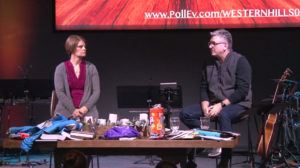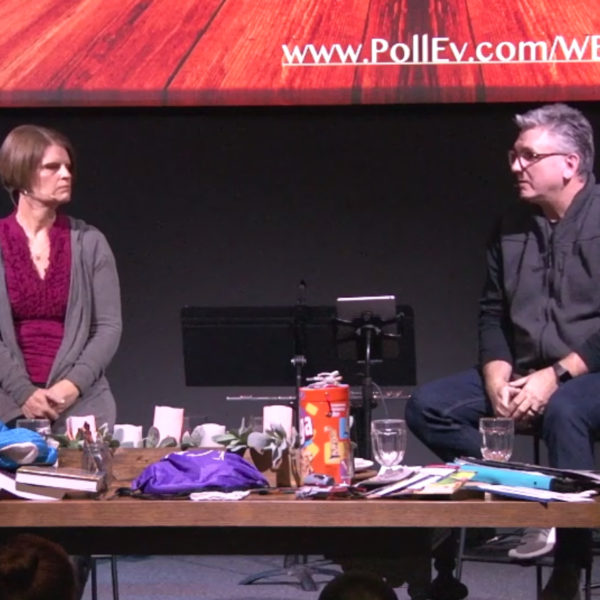Answering Questions On Parenting

This past Sunday was my favorite Sunday teaching. Ever. (You can see it for yourself here.) I had the honor to teach alongside Amy (my bride) on the topic of parenting. We allowed the opportunity for folks to ask questions during the message. I encourage you to listen to it for the full context, but let’s tackle a couple of questions that were asked here.
How do you confess to your kids that you made a mistake in your parenting without letting them see you truly have no idea what you’re doing?
One of the primary goals we have for our kids is to experience the unconditional love of Jesus, not to believe that we are the perfect parents. Therefore, we have made multiple trips to their room after the fireworks of an argument to apologize for HOW we handled a situation. It gave our kids an opportunity to give grace and forgiveness instead of just receiving it.
It doesn’t undermine your authority when you apologize for something you’ve done wrong – like losing your cool or overreacting. If anything, it increases your credibility by being transparent and authentic. I apologize for HOW I handled this. I should not have lost my cool. Yes, you are still grounded.
We consistently remind our kids that this is first time we’ve parented in these waters. It is like putting together an airplane while it is in the air.
How do you gauge your kids’ sincerity in their decisions versus just trying to please mom and dad?
I hope I understand the question correctly, but let’s start with what Amy said on Sunday: work backwards from the behavior to the heart. She does a great job unpacking that in greater detail, so I won’t repeat all of that here. I will say that I’m not sure how important ‘sincerity’ is in cases of obedience or wise decisions. Here’s why…
Every decision has consequences. Some good, bad, ugly, indifferent, unintended – you get the idea. Some decisions I make are made because I don’t want to deal with the bad, ugly, unintended, not-so-good consequences. It’s not because I LOVE the decision or I sincerely WANT to make that decision.
If I like sleeping in so much that I sleep in all week and miss work or class, then that will have its own set of consequences. Get fired, fail assignments, no paycheck, don’t graduate, lose trust, etc. So get up, shower, and grind out the day. Begrudgingly. Is that ‘insincere?’ Sure, but we could also call it MATURITY. Making the right, good decision and grinding through it is called adulting. This is what we want our kids to learn, right?
When you have multiple kids and have to discipline them differently, how do you explain that to them?
We will parent you at the level of maturity you have displayed.
If a kid continuously lies, doesn’t own their junk, and has to learn things the hard way – we parent that child very differently than the one who is compliant and receives instruction willingly. It’s not about love. It’s about what they have exhibited they need in order to learn how to be a better adult. And all we have to base this decision on is their past behavior. That’s all we have to make decisions on – the character and pattern they’ve established.
The good news is they have control over that. The bad news is it takes a long time to earn back the trust they’ve destroyed. It’s possible, it’s just harder.
So when we get hit with the argument, ‘Why do you keep bringing up my past? Where is the forgiveness?’ The answer is, ‘You have been forgiven,’ but forgiveness is different than consequences. And one of the consequences is that your behavior is tied to a heart issue, and your behavior is showing us that you still have this heart issue. In short, YOU keep bringing up the past by your decisions and actions. When you prove that you’ve learned this lesson or can handle conflict maturely or not lie, then it won’t be brought up anymore.
This is one of those ‘hard decisions’ of parenting. Kids won’t understand or see in the moment why you’ve parented them differently. That takes some maturity which none of us had in that moment. All they see is that life isn’t fair and you didn’t treat them the same way you treated their sister. Amy and I always admitted that from the start: absolutely, we are parenting each of you differently because each of you behave differently. We told each of our kids – you have significant control over how we parent you based on how you handle hardship.
Along those same lines, trust is different than love. Love is unconditionally given. Love is never earned. There’s nothing they will ever do that will make us love them less. Trust? Completely different. Trust is earned. It can be destroyed. It can be built up. It always takes longer to build than to destroy. Trust is the difference between having an adult/mature relationship with your kids and having to treat them like 4-year olds.
What priority should biological kids be given in a divorced/step-family situation?
The marriage is the most important earthly relationship.
This does not mean you can’t be a great parent if you are a single parent. This does not mean you SHOULD get married if you have a kid out of wedlock. This does not mean you should get remarried if you are divorced.
What I am saying is – IF you get married, that relationship should have the number 1 earthly priority in your life. ABOVE your kids. Biological. Step. Foster. Adopted.
Doesn’t matter if it’s the first marriage or the second (or third). Marriage is where we make vows to another person. Marriage is the foundation of the family. Christian Marriage is supposed to give the world a glimpse of what unconditional love looks like and is to reflect Jesus’ relationship with the Church. Chances are great that our kids will one day be married, and they need to have a model of what LEAVE, CLEAVE, and BECOME ONE looks like (Gen 2:24). When the marriage is given first priority, it allows you to parent together.
I could go on, but the goal is to raise responsible, contributing adults. That means learning the world doesn’t revolve around them, the world doesn’t owe them anything. If the marriage is given first priority in a divorce situation, hopefully the outcome will be that the child gains a parent – not lose one.
Please join us for the next two weeks as well. Amy and I will be talking about relationships and conflict resolution. We’ll take a look at how marriage and any other great relationship requires work and intentionality. Hope to see you there.













 I miss my grandfather.
I miss my grandfather.
 It sounded like a good idea at the time.
It sounded like a good idea at the time.
 One of my favorite nativity scenes of all times involves a Delorean and Yoda. I’m not saying it’s accurate. I’m saying I like it. Actually, I love the idea behind it better. Looking at the Christmas story through the eyes of people who we typically don’t think of being a part of the Christmas story. And if that happens to involve characters from movies of my childhood… all the better.
One of my favorite nativity scenes of all times involves a Delorean and Yoda. I’m not saying it’s accurate. I’m saying I like it. Actually, I love the idea behind it better. Looking at the Christmas story through the eyes of people who we typically don’t think of being a part of the Christmas story. And if that happens to involve characters from movies of my childhood… all the better.
